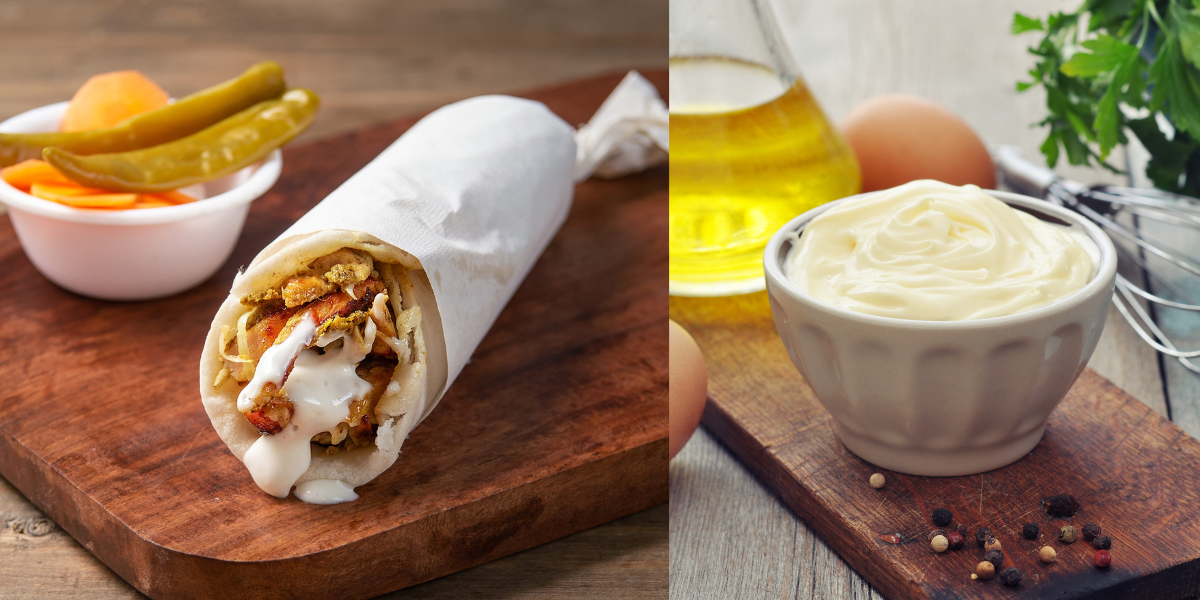Kerala is not unfamiliar with food poisoning deaths. Cases have been reported even after consumption of shawarmas. And mayonnaise is the main reason.

Improperly made/stored mayonnaise can cause bacteria to grow, resulting in food poisoning. (Wikimedia Commons)
Shawarma, the flavorful West Asian wrap filled with spiced meat and tantalising sauces, has always been a favourite among food enthusiasts worldwide.
However, concerns over one of its key ingredients — mayonnaise — following the recent death of a man in Kerala, has left many questioning their next bite.
South First speaks to experts on the precautions to be taken before eating this delicious white condiment!
In a tragic turn of events, 24-year-old Rahul D Nair lost his life to food poisoning, which was believed to have resulted from consuming a shawarma, a popular street delicacy, from a hotel in Kochi, Kerala.
Hailing from Teekoy in the Kottayam district, Rahul was hospitalised on Saturday, 21 October, following severe symptoms of food poisoning. His condition deteriorated rapidly, culminating in multi-organ failure, his family informed the authorities.
This incident has raised alarm bells over the implementation of and compliance with the state’s food safety guidelines, issued over a year ago.
The new regulations, which were introduced in September last year, required all eateries serving shawarmas to obtain a mandatory license. The move was a response to several reported incidents of food poisoning linked to shawarma consumption, including the tragic death of a 16-year-old girl in Kasaragod in May that year.
The state Health Department guidelines includes mentioning the date and time of the dish’s preparation in the packaging/parcel packets, and a warning not to consume it after an hour. It also warned establishments not following food safety standards of a ₹5 lakh fine and six months imprisonment.
According to food safety experts, food poisoning from a shawarma can arise due to various reasons. This includes undercooked meat, cross-contamination, inadequate refrigeration, and contaminated/old mayonnaise, which can lead to the proliferation of harmful bacteria like Salmonella or E coli.
Such bacteria can trigger serious health complications.
Speaking to South First, Dr Rajeev Jayadevan, renowned gastroenterologist from Kochi explains that locally-made mayonnaise has been implicated in several cases of food poisoning in Kerala.
Dr Jayadevan opines, “The allure of street food, while tempting, carries inherent risks. It’s vital for consumers to be discerning and prioritise their health. Ensuring the freshness of what they consume and the hygiene of its preparation is paramount.”
Traditionally made with raw eggs, oil, and vinegar, Dr Jayadevan explains that mayonnaise is designed for immediate consumption. Proper storage, if not eaten promptly, mandates refrigeration and quick usage. However, ground realities paint a different picture.
“Mayonnaise whipped up in the afternoon often finds its way to customers only by late evening. The lapse in time, especially if not refrigerated, creates a breeding ground for bacteria like Salmonella, which can be present on the unwashed shells of the eggs used in preparation,” he says.
The situation becomes murkier when consumers delay their meal after receiving it, allowing the bacteria to multiply further. Street vendors, with their warm conditions, only add to the woes by accelerating bacterial growth.
Following the surge in shawarma-related food poisoning cases, vendors were directed to eliminate raw eggs from mayonnaise preparation. While this step is in the right direction, ensuring consistent adherence to this guideline remains a challenge.
Doctors opine that this thick white sauce, which definitely adds extra flavour to not just shawarmas but also to many vegetarian and non-vegetarian delicacies — including coffee, must definitely be handled carefully.
Explaining further, Dr Sujit Vasudevan, a family physician from Kerala, says that mayonnaise has also been known to cause food poisoning and fatalities in Western countries, too.
“One of the primary ingredients is raw egg, which is a commonly reported source of Salmonella contamination. This is a virulent bacteria,” Dr Vasudevan explains.
Listing the symptoms of Salmonella poisoning, Dr Vasudevan says, “Salmonella poisoning usually starts with vomiting and progresses to abdominal cramps, diarrhoea, and fever, and can lead to septicemia and even death. Any combination of symptoms is possible.”
Doctors also explain that mayonnaise is a perishable food item, which means it can spoil quickly if not stored properly. Once opened, it must be kept refrigerated and used within the manufacturer’s recommended time.
Meanwhile, there are dangers of cross-contamination with mayonnaise, too. For instance, if utensils or kitchen equipment that have come in contact with raw foods, like meat, touch mayonnaise without being properly cleaned, it can introduce pathogens into the product.

Jul 26, 2024

Jul 26, 2024

Jul 26, 2024

Jul 26, 2024

Jul 26, 2024

Jul 26, 2024